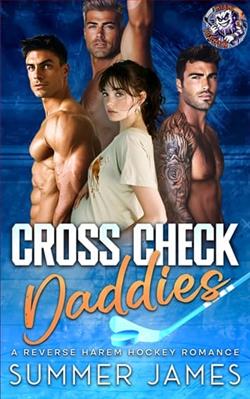Page 17 of Kiwi Sin
“Yes, miss,” I said again, but privately thought,I am not asking in front of everybody.If that made me disobedient—well, you were supposed to be disobedient Outside! At least it seemed that way to me.I’d learnt to use a computer by now—no choice—and I’d discovered that you could find the answers to most questions just by typing the words into the search bar and reading what came up.Thatwas what I was going to do when I didn’t understand something. I might not be clever like Frankie, but I was clever enough for that..
Today, Ms. Roberts was talking about the idea of the “other,” and, as usual, I was writing everything down and understanding about half of it. “When a country’s having problems,” she said, “maybe inflation or poverty or social unrest or even war, and the people are dissatisfied with their leaders and their lives, it can seem like an easy out to focus their attention instead on a perceived common enemy, or even better—a group of enemies, and get them to bond around that. Anhistoricenemy is even better. We all feel virtuous, don’t we, when we’re united in righteous anger against people we perceive as evil? Who has an example for me?”
“The Christchurch mosque shootings,” somebody said. A girl named Aisha, who wore a headscarf anddidparticipate in class.
“Excellent,” Ms. Roberts said. “Both ways around, wouldn’t you say?”
“Oh, I see,” Aisha said, sitting up straighter. “Because the shooter was targeting a scapegoat—Muslims—because he’d been radicalized to hate them and blame them for everything, but the country afterward—”
“How everybody came together,” another girl named Harper called out. It still startled me, the way pupils sometimes wouldn’t even raise their hands or wait to be called on and just shouted out answers instead, but Ms. Roberts loved it.
“Expand,” Ms. Roberts said.
“How they united against whattheysaw as evil,” Harper said, “and doing that made everybody feel warm and fuzzy and close.”
“And the Hollow-cost,” a girl named Charlotte said. “Both ways again.”
“The Hollow-cost is an excellent example,” Ms. Roberts said. “In fact, you’ve managed to circle around to the place I wanted to go today, Charlotte.” Charlotte beamed, because she loved being right, and Ms. Roberts went on, “I’d like to talk about that more today. About the Hollow-cost and the history behind it, because that idea didn’t spring from nowhere.”
Uh-oh. When she said, “I’d like to talk about that more,” that meant it was the point of the lecture—why couldn’t she justsaythe point, so I could write it down?—and it would be on the exam at the end of the year. The problem was, I didn’t have a clue what she was talking about, and she was constantly veering away from the textbook, which was about “The Rise of the Nation-State” at this point in the class and no help at all, even though I’d read the chapter twice.
No, she went on and on about the Hollow-cost instead, and it was like she was talking in code. I waited as long as I could, hoping I’d pick up the thread again, then raised my hand. I didn’t want to, but I did.
She looked pleased. “Yes, Oriana? You have a contribution?”
I asked, “Could you spell the Hollow-cost, please, miss, so I can look it up?”
“The Hollow-cost?” she asked in surprise. “You’ve never heard of it?”
Nothing to do, as the whole class either drew in a shocked breath or laughed, but say it. “No, miss.”
“The Hollow-cost was the wholesale and deliberate mass murder of European Jews by the Nazis before and during World War II,” she said. And wrote the word on the board for me, spelling it aloud with her usual extra-kindness, like I was delayed.
“Oh,” I said. “Thank you. But I thought that wasn’t going to happen until Armageddon.”
More gasping and laughing. Ms. Roberts looked horrified, and I wanted to sink through the floor. Especially when she explained more about it, kindly still, and I started to cry. I tried not to, but it was sohorrible.
I was sitting in the back, as usual, but everybody had turned around in their chairs to look at me. It was basically my worst nightmare. Ms. Roberts said, “Maybe you’d like to go to the toilet and collect yourself, Oriana. We can talk after school, if you like.”
“She doesn’t need to talk after school,” Aisha said. “She just needs you lot to stop being such arseholes. How would she know? She spent her whole life in a cult! Everybody’s heard that, but you keep badgeringher anyway, laughing at her, until she’s scared to say anything at all. You’re talking about the other, about how people set up in-groups and out-groups, and how the in-group gangs up on the out-group to feel superior? How about what’s happening here? How is this different from bullying me because I wear hijab?”
“Nobody bullies you because you wear hijab,” Charlotte said piously. “We wouldn’t.”
“But it’s all right to laugh at Oriana,” Aisha flashed back. “Because she was raised with ideas you think are wrong.”
“Well, theyarewrong,” drawled a sarcastic girl named Lucy, who wasalsoin Biology with me and probably loved Mr. Smith’s sense of humor. “People riding dinosaurs? I guess they don’t give you much counter-programming at Mount Zion, though.”
She was twisted around in her chair, talking to me as if we weren’t in school, her expression expectant, as if I might entertain her some more with stories about Noah, and I said, “I’m not sure what that means.”
“They don’t expose you to different ideas, she means,” Aisha said. “They don’t explain the theory of evolution or carbon dating, they don’t talk about rock layers, they just talk about God making the earth and all the creatures in six days, and then twist themselves into knots explaining dinosaurs and ice ages and all those rock layers. They teach you about Armageddon, but not about the Holocaust.”
“Yes,” I said.
“Relativity,” Ms. Roberts said. She looked pleased as punch, somehow, even though, again, this was like no classroom I’d ever been in. “It’s not just a physics concept. We all view the world in relation to our own background, our own point of view. It requires a higher power of thinking, and maybe disengaging our emotions, to turn around and examine the other person’s point of view, but that’s the only way change really happens, isn’t it? That’s the basis of diplomacy, after all—understanding what the other person believes, and what they want. What’s the opposite of diplomacy?”
“War,” I said. It was the first time I’d volunteered anything in this class, or in any class. It was just that Ihadlearnt about wars in school. Mount Zion was very big on wars.
“Ah,” Ms. Roberts said, a satisfied sound. “Explain.”















